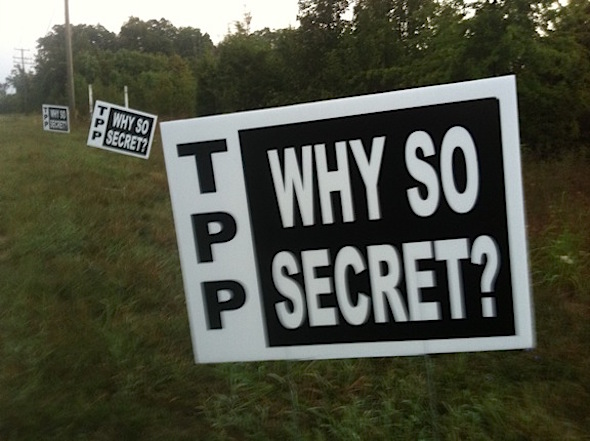
With each leaked copy of the TPP’s Intellectual Property text, we see a steady erosion of consumer protection and strengthening of corporate protection.
The final version of this text, released by Wikileaks, for the most part, does not depart from this trend.
Right Holders Get Strong, Binding Rules. Users Get Soft, Pleasant-sounding Guidelines
A cursory examination of the text might lead you to believe that the document is balanced… Fair even. Don’t be fooled. The fact is that though that the text was designed to sound fair, those who know how to read between the lines will realize just how horribly biased it is against us.
For one thing, provisions that recognize the rights of the public are non-binding… while those that somehow benefit right holders are binding. (Right holders are basically the people who own the exclusive rights to a copyright, patent or trademark- this could be the inventor/ author, the family of the inventor/ author, or more likely the company that bought that bit of intellectual property from them.)
In fact, provisions that protected us were stronger in the first leaked draft: despite how pleasant platitudes like recognizing the “importance of a rich and accessible public domain” sound in this last version, the first draft had specific obligations written detailing how the public’s access to the public domain had to be identified, preserved and promoted. This is but one example of their ambiguity when it comes to stuff that protects us…
In essence, the corporations have decided that we won’t care whether we’re getting screwed… as long as the rules they’ve written sound pleasant enough.
Copyright Gets Life Plus 70 Years
As much as I recognize that an artist/ author/ maniacal corporation needs to benefit significantly before he/ she/ that thing undertakes the necessary time, money and effort necessary to bring an idea to life… to allow a copyright to last as long as the original creator does, and to add another 70 years to that is ridiculous. Seriously, letting a company profit for an additional “life” on top of the author’s hardly provides any incentive for the dead guy to keep writing.
Earlier drafts had been even worse, tacking on 120 years instead of “only” 70. The idea, after all, is to spit out a number that is so obscenely high that the “middle ground” is still planted firmly inside ridiculous-insane territory.
Some countries have been granted 2-5 years to comply with these regulations, while others have been given no time whatsoever to transition to this despicable system.
No More Breaking Digital Rights Management (DRM)
Basically, anybody who attempts to get around DRM, even if they only intended to do so for personal use and had no intention whatsoever of disseminating the content, can be made criminally liable. Although it is possible for countries to make exceptions to account for such things, it is not mandatory for them to do so.
The removal of “rights management information” can be similarly punished- even if attribution is made to the original creator in some other way, and the material was being used for “fair use” purposes.
Criminal Enforcement and Civil Damages
Right holders are able to submit ANY “legitimate measure of value” to a judicial authority in order to determine the extent of damages- basically giving them all the authority to decide with their crony-courts just how much to punish you for copying their stuff.
Worse yet, implements used to create infringing copies can also be destroyed: copy that picture of a flower for a montage? Lose your entire computer.
Copyright infringement can even lead to jail time, even if copying was not done for financial gain.
Trade Secrets
Although it remains unaltered from previous iterations, the protection of these trade secrets remains as stringent as ever. Whistle-blowers and investigative journalists beware, for there are no mandatory exceptions for you even if the release of that information was beneficial to society in general.
Pharmaceuticals
From Public Citizen:
“If the TPP is ratified, people in Pacific Rim countries would have to live by the rules in this leaked text,” said Peter Maybarduk, director of Public Citizen’s Global Access to Medicines program. “The new monopoly rights for big pharmaceutical firms would compromise access in TPP countries. The TPP would cost lives. These final TPP rules would lengthen, strengthen and broaden special patent and data protections, which pharmaceutical companies use to delay generic competition and keep drug prices high.”
“Forcing expansive pharmaceutical monopoly rules on countries that can scarcely afford high drug prices has not always been U.S. trade policy, and in the past U.S. policymakers have recognized that the needs of developing countries should not always be subordinate to U.S. pharmaceutical industry profits,” said Maybarduk. “Some rare public servants from TPP countries fought back and stood for health in this negotiation. Their efforts saved lives,” said Maybarduk. “Yet in the end, the TPP will still trade away our health.”
“The monopolist pharmaceutical industry has won a lot with the TPP, at the expense of people’s health,” said Burcu Kilic, policy director for Public Citizen’s Global Access to Medicines program. “They should stop crying crocodile tears.”
Nuff’ said.
Sources: Electronic Frontier Foundadtion, Public Citizen, Global Research
This Article (Final Version of TPP’s IP Text Leaked) is free and open source. You have permission to republish this article under a Creative Commons license with attribution to the author(CoNN) and AnonHQ.com.





HELL NO! to TPP
Frick en sickening. But the sheep will fall for it the same.